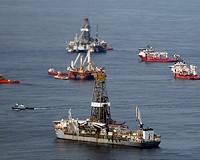 |
Yaounde, Cameroon (UPI) Dec 2, 2010 Cameroon, a tiny off-the-beaten-track country in West Africa, is grappling with mounting attacks on its fledgling oil industry that threaten its economic prospects and have already slashed production by 13 percent. On Nov. 16 gunmen attacked an offshore platform in the Moudi oil field in the Gulf of Guinea, plagued by pirates and insurgents from neighboring Nigeria, operated by Franco-British oil firm Perenco. Six men -- three civilians, two Cameroonian soldiers and a rebel -- were killed. The following day the Africa Marine Commando, the Cameroonian rebel group that claimed responsibility for the attack, threatened further strikes against oil facilities if oil companies do not pay a "security tax" to the insurgents. Cameroon has oil reserves estimated at 200 million barrels. But production has fallen from a 2005 high of 94,000 barrels per day to 77,000 bpd, according to the Jamestown Foundation, a Washington think tank that monitors global insurgencies. "Though much of Cameroon's oil industry is still in the exploration stage, there are high expectations of further discoveries," the foundation said. It is also well-placed to become a regional oil export hub. The violence could affect U.S. oil supplies from West Africa. By 2025 the region is expected to account for one-quarter of U.S. oil imports. Cameroon's security problems have been compounded in recent months by spillover violence from Nigeria, Cameroon's larger eastern neighbor that has been plagued by a resurgent oil field insurgency since 2006. The campaign by the Nigerian insurgents, led by the Movement for the Emancipation of the Niger Delta, has reduced the country's oil production by 40 percent in that period. On top of that, the wholesale theft of oil by criminal gangs associated with MEND operating in the swampy delta and the Gulf of Guinea has cost the Nigerian government an estimated $1 billion a year. The smugglers sell much of this Nigerian oil to neighboring states such as Cameroon, Niger and Benin, which function largely on cheap illicit gasoline. The crisis in Cameroon is centered on the oil-rich Bakassi Peninsula, a region of mangrove swamps administered by Nigeria until 2006, and has expanded offshore. In September, the AMC abducted six seamen on a Belgian ship in the Gulf of Guinea, one of the hottest oil zones in West Africa that embraces Cameroon, Angola, Nigeria, Equatorial Guinea and Gabon. The group kidnapped seven Chinese fishermen around the same time. They were freed for an undisclosed ransom. Cameroon, with a population of 20 million, was created in 1961 by the unification of two former colonies, one British and one French. Cameroon and Nigeria fought over the disputed Bakassi region, formerly governed by the British and whose people consider themselves Nigerian, in 1994 and 1996. Nigeria withdrew its troops from the region in 2006 in line with a ruling by the International Court of Justice that awarded sovereignty to Cameroon. Militias in Bakassi, opposed to the region's handover to Cameroon, have been fighting government troops for several years. In July 2006 the Bakassi Movement for Self-Determination joined the Southern Cameroons Peoples Organization, known as SCAPO, and Nigeria's MEND to declare the establishment of the Democratic Republic of Bakassi. The main adversary of the Cameroonian rebels is the government's rapid deployment battalion, known as BIR, formed in 1999 to combat rebels and bandits. According to Andrew McGregor of the Jamestown Foundation, this elite force "has mutated into something of a Praetorian Guard for President Paul Biya, an authoritarian who has ruled Cameroon since 1982." McGregor observed: "For once, oil is not the main source of the conflict, as Nigeria and Cameroon have agreed to share the revenues from any oil produced off the Bakassi coast. "It is, however, an aggravating factor with local militants who complain of the inequitable distribution of oil revenues and the presence of large multinationals with little concern for the wellbeing of local residents." But he stressed that the BIR is increasingly seen by the people of Bakassi as "a colonial-style occupation force." The divide in Bakassi "invites the spread of a Niger Delta-style, low-level insurgency that is willing to hobble the development of the oil industry in the Gulf of Guinea through kidnappings and armed attacks to achieve its political aims -- independence or a return to Nigerian sovereignty," McGregor said.
Share This Article With Planet Earth
Related Links Powering The World in the 21st Century at Energy-Daily.com
 Obama reverses oil drill expansion after BP spill
Obama reverses oil drill expansion after BP spillWashington (AFP) Dec 1, 2010 President Barack Obama on Wednesday reversed a March decision to expand offshore oil exploration to the Atlantic Ocean and eastern Gulf of Mexico, but allowed deepwater drilling to continue in the part of the Gulf hit by the BP disaster. The move, announced by Interior Secretary Ken Salazar, would ban until beyond 2017 oil and gas exploration in areas where there is currently no drilling act ... read more |
|
| The content herein, unless otherwise known to be public domain, are Copyright 1995-2010 - SpaceDaily. AFP and UPI Wire Stories are copyright Agence France-Presse and United Press International. ESA Portal Reports are copyright European Space Agency. All NASA sourced material is public domain. Additional copyrights may apply in whole or part to other bona fide parties. Advertising does not imply endorsement,agreement or approval of any opinions, statements or information provided by SpaceDaily on any Web page published or hosted by SpaceDaily. Privacy Statement |